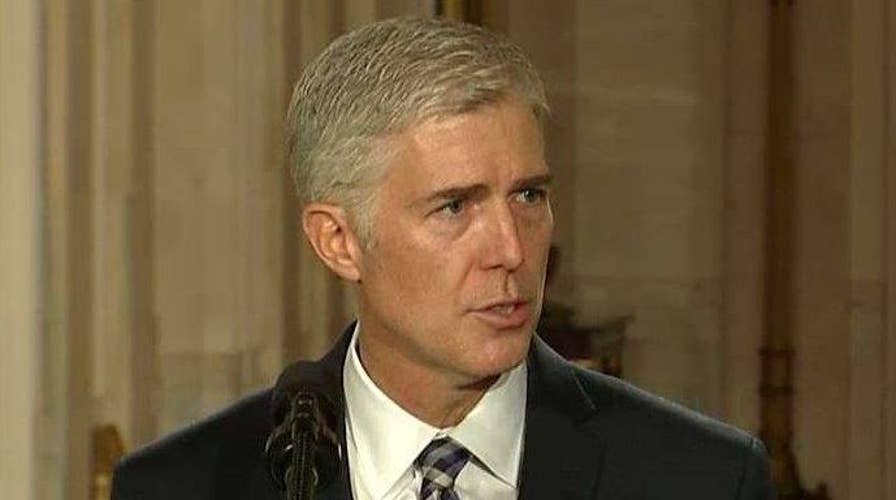Neil Gorsuch: I am honored and I am humbled
President Trump's Supreme Court nominee speaks out
Every Supreme Court vacancy is a monumental moment in the history of our great nation and for our Constitution.
But filling the seat of the late Associate Justice Antonin Scalia – the conservative lion of the Court and one of the most important and significant Supreme Court justices in our nation's history – is a task that brings even higher stakes and consequences for the future of our constitutional republic.
Justice Antonin Scalia was an intellectual giant. He was one of our country's most ardently brilliant supporters of the U.S. Constitution and the American experiment in freedom and justice. His opinions, concurrences, dissents, and other writings were must-reads in the legal community, no matter your ideological persuasion.
I had the distinct honor and privilege of knowing Justice Scalia for the more than 25 years I have practiced before the court. Justice Scalia had a keen understanding of what our Founding Fathers intended and dedicated his life to carrying out the rule of law. He was also a supremely decent man.
His intellect was matched only by his wit and zest for life. He realized that the strength of our nation was found in its people, each of whom deserves the right to life because they are made in the image of God. As the justice who taught generations of attorneys, law students, and Americans about originalism and textualism in order to adhere to our Founding Fathers' ideals of freedom and representative democracy against the dangers and pitfalls of judicial activism, his legacy is in so many ways unmatched.
Furthermore, Justice Scalia believed strongly in a fierce battle of ideas. He understood that those ideas would shape the destiny of this nation and the American People. Motivated by his strong Catholic faith, Justice Scalia was courageous in the public square, and notorious for standing by his convictions. Even so, Justice Scalia embraced those with a different perspective. Perhaps the best evidence of this was the fact that his closest friend on the Court was Justice Ginsburg.
One of Justice Scalia’s strongest convictions – which was threaded throughout his opinions, writings, and speeches – was that our constitutional structural protections (such as separation of powers and federalism) are what best protect our individual freedoms and liberties. Along with originalism and textualism, these foundational beliefs undergirded his defense of life, our First Amendment freedoms, and a robust civil society.
For many Americans on both sides of the political aisle, filling Justice Scalia's seat on our nation's highest court was the definitive issue of the 2016 election. And now, with the nomination of Judge Neil Gorsuch to the Supreme Court, President Trump gives us the opportunity to ensure we have another justice to continue this legacy of liberty on our nation's highest court.
Like Justice Scalia, Judge Gorsuch is a remarkably qualified nominee with a conservative judicial philosophy and a commitment to uphold the rule of law and the Constitution. He is decidedly pro-life and understands what it means to protect the constitutional freedoms afforded to all Americans. As a member of the U.S. Court of Appeals for the 10th Circuit, he has often defended a robust definition of religious freedom in cases we’ve been involved in, ranging from Ten Commandments monuments to Christian businesses and non-profits challenging the Obama Administration’s abortion-pill mandate. He has been a fierce defender of the intrinsic value of every life, publishing a book against the legalization of euthanasia.
As we begin this process of filling Justice Scalia’s seat, we should do so mindful of the legacy he leaves behind. That legacy deserves a nominee with an undying fidelity to the Constitution – something that Judge Gorsuch has clearly demonstrated. As the U.S. Senate undertakes its constitutional duty to review the President’s nominee, it must do so not through the lens of politics, but mindful of the reverence to the U.S. Constitution for which Justice Scalia was known.
I am confident this review will result in the confirmation of Judge Gorsuch. The defense of our Constitution and our country’s values depend on it. And the legacy of Justice Scalia demands it.









































